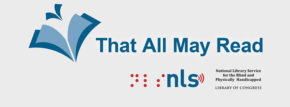Libraries and Blind People: Looking Toward the Future
As a blind person growing up in the 1950s and ’60s, I did not have real access to libraries. Instead I, like most blind persons, received borrowed books through a program known as the Talking Book program funded by the Library of Congress. Under this program professional actors and readers were hired to record books which were then transcribed onto records. If I wanted a book I could call my local talking book library, 65 miles away, and, if the book happened to be recorded, it would be sent to me. Also, often, library staff would send me what they thought I should get, especially if my requested manuscript was not available. Usually books I wanted were not recorded. Only a few hundred and then a few thousand books were transcribed nationally. Sometimes books were even made available in Braille, the only true reading and writing language available to blind persons.
Later, as I attended college and studied Physics, I had books transcribed into Braille by volunteers who took the time to learn Braille mathematics known as the Nemeth code named after a blind math professor, Abraham Nemeth. At the same time more and more books were being recorded on records and then later on cassettes. Other companies also began recording commercial books which occasionally were made available through the Talking Book process. Braille literacydropped. Only 10% of all blind people read it. This is a true crime, as without Braille how can we expect blind people to learn to write, construct sentences, and be true contributors to a literate society?
Do you see a pattern here? Libraries as such were not available to me and other blind people. We could not wander through the stacks. We did not, and for the most part, do not have the same access to reference and most other materials. One great advance came with the reasonably inexpensive access to the internet. Suddenly a treasure trove of material came available. Many books became available online. However, many of these books were simply scanned images of book pages, something inaccessible to us as blind people because they were graphical representations of the texts, and not text that our computers could read aloud to us nor which we could print in Braille.
Technology and access are sort of catching up. Recent legal pursuits have led to mandates that the entire library of 10,000,000 texts under the control of Google are now required to be made available to blind people. Through a device known as Aira, a blind person can use a special pair of smart glasses and a smart phone to contact specially trained agents who can, among other things, read aloud all those texts that we could never read for ourselves. With Aira I now can even start to browse those long inaccessible stacks in any library and read to my heart’s content.
Not all material is yet available to me in Braille or in a form that I can convert to Braille. However, the time is growing nearer when I truly will have real access to libraries in addition to what I now have using Aira. This is important to me as it should be for every person. Libraries contain the road to knowledge and education. I want that as much as anything. Educated blind people will be better contributors to society. We who are blind are working to raise the expectations that sighted people have about us. Library access and a strong desire to learn and know will help us move toward our goal. Aira will help, but better access to Braille education and Braille texts will help even more.
Look out world! We want to join you and we will do so. We have a lot to offer and through library access we will get there.



 Facebook
Facebook Twitter
Twitter Youtube
Youtube Linkedin
Linkedin